University of Suffolk BABS Reflective Journal: Skills Development
VerifiedAdded on 2023/06/15
|8
|2051
|410
Journal and Reflective Writing
AI Summary
This reflective journal utilizes Gibb’s reflective cycle to analyze the impact of a Personal and Professional Development module and university experience on employability skills. It discusses experiences in team projects, highlighting strengths in communication and teamwork, while acknowledging weaknesses in time management and problem-solving. The journal includes an action plan for improving problem-solving and time management skills, with specific strategies and evaluation parameters. The reflection concludes that the module contributed to professional communication, research, and teamwork skills but emphasizes the need for further development in problem-solving and time management to enhance both individual and team performance. It also provides references to support the analysis and action plan.
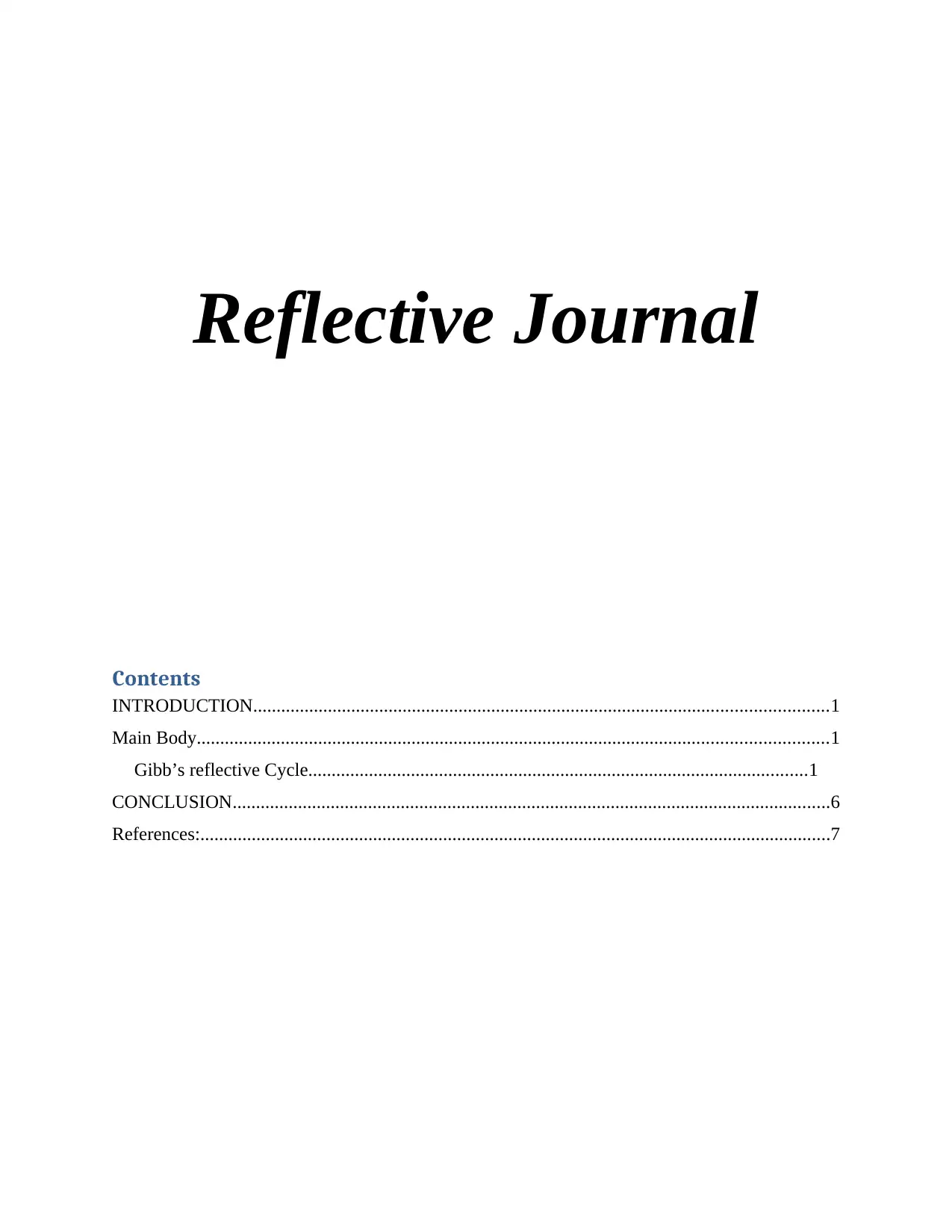
Reflective Journal
Contents
INTRODUCTION...........................................................................................................................1
Main Body.......................................................................................................................................1
Gibb’s reflective Cycle...........................................................................................................1
CONCLUSION................................................................................................................................6
References:.......................................................................................................................................7
Contents
INTRODUCTION...........................................................................................................................1
Main Body.......................................................................................................................................1
Gibb’s reflective Cycle...........................................................................................................1
CONCLUSION................................................................................................................................6
References:.......................................................................................................................................7
Paraphrase This Document
Need a fresh take? Get an instant paraphrase of this document with our AI Paraphraser
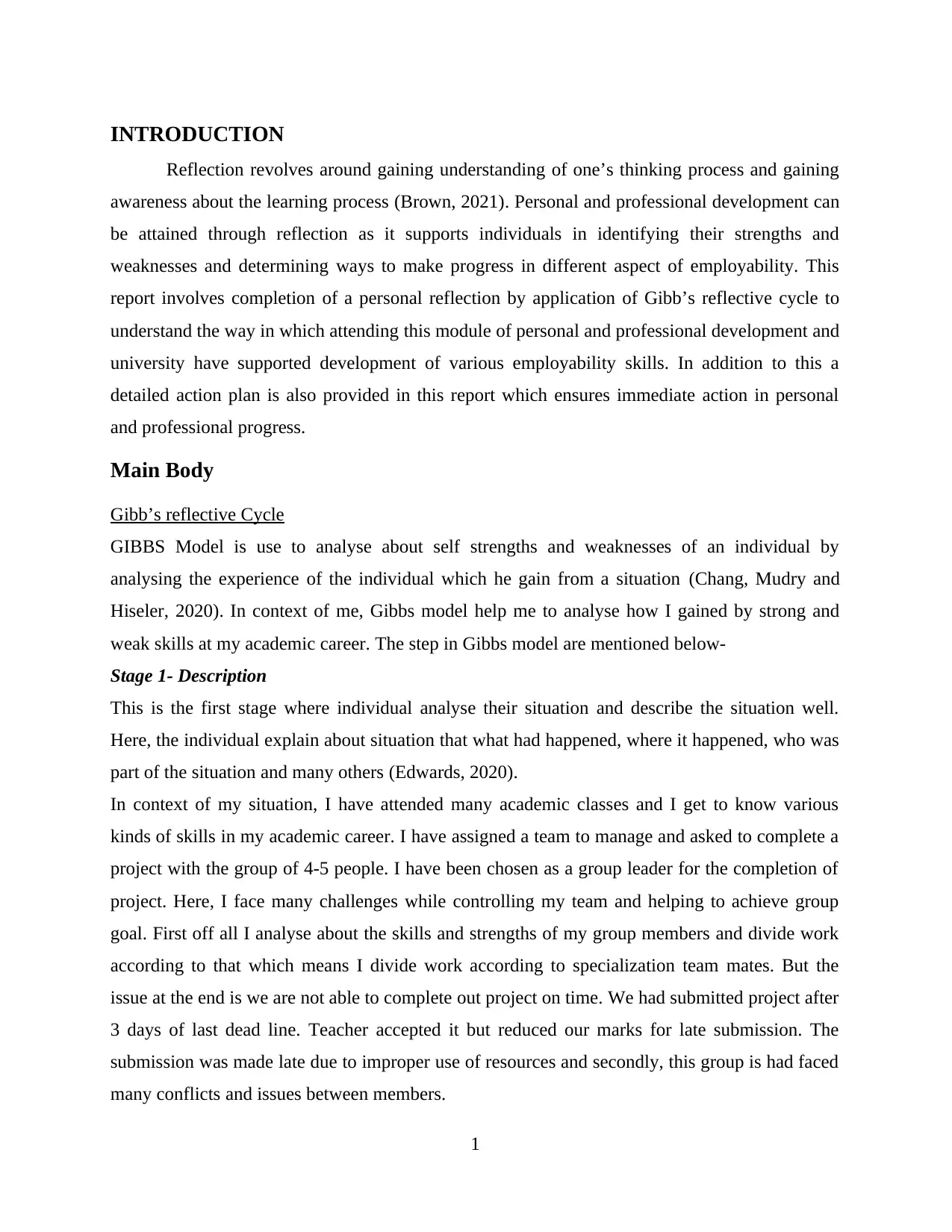
INTRODUCTION
Reflection revolves around gaining understanding of one’s thinking process and gaining
awareness about the learning process (Brown, 2021). Personal and professional development can
be attained through reflection as it supports individuals in identifying their strengths and
weaknesses and determining ways to make progress in different aspect of employability. This
report involves completion of a personal reflection by application of Gibb’s reflective cycle to
understand the way in which attending this module of personal and professional development and
university have supported development of various employability skills. In addition to this a
detailed action plan is also provided in this report which ensures immediate action in personal
and professional progress.
Main Body
Gibb’s reflective Cycle
GIBBS Model is use to analyse about self strengths and weaknesses of an individual by
analysing the experience of the individual which he gain from a situation (Chang, Mudry and
Hiseler, 2020). In context of me, Gibbs model help me to analyse how I gained by strong and
weak skills at my academic career. The step in Gibbs model are mentioned below-
Stage 1- Description
This is the first stage where individual analyse their situation and describe the situation well.
Here, the individual explain about situation that what had happened, where it happened, who was
part of the situation and many others (Edwards, 2020).
In context of my situation, I have attended many academic classes and I get to know various
kinds of skills in my academic career. I have assigned a team to manage and asked to complete a
project with the group of 4-5 people. I have been chosen as a group leader for the completion of
project. Here, I face many challenges while controlling my team and helping to achieve group
goal. First off all I analyse about the skills and strengths of my group members and divide work
according to that which means I divide work according to specialization team mates. But the
issue at the end is we are not able to complete out project on time. We had submitted project after
3 days of last dead line. Teacher accepted it but reduced our marks for late submission. The
submission was made late due to improper use of resources and secondly, this group is had faced
many conflicts and issues between members.
1
Reflection revolves around gaining understanding of one’s thinking process and gaining
awareness about the learning process (Brown, 2021). Personal and professional development can
be attained through reflection as it supports individuals in identifying their strengths and
weaknesses and determining ways to make progress in different aspect of employability. This
report involves completion of a personal reflection by application of Gibb’s reflective cycle to
understand the way in which attending this module of personal and professional development and
university have supported development of various employability skills. In addition to this a
detailed action plan is also provided in this report which ensures immediate action in personal
and professional progress.
Main Body
Gibb’s reflective Cycle
GIBBS Model is use to analyse about self strengths and weaknesses of an individual by
analysing the experience of the individual which he gain from a situation (Chang, Mudry and
Hiseler, 2020). In context of me, Gibbs model help me to analyse how I gained by strong and
weak skills at my academic career. The step in Gibbs model are mentioned below-
Stage 1- Description
This is the first stage where individual analyse their situation and describe the situation well.
Here, the individual explain about situation that what had happened, where it happened, who was
part of the situation and many others (Edwards, 2020).
In context of my situation, I have attended many academic classes and I get to know various
kinds of skills in my academic career. I have assigned a team to manage and asked to complete a
project with the group of 4-5 people. I have been chosen as a group leader for the completion of
project. Here, I face many challenges while controlling my team and helping to achieve group
goal. First off all I analyse about the skills and strengths of my group members and divide work
according to that which means I divide work according to specialization team mates. But the
issue at the end is we are not able to complete out project on time. We had submitted project after
3 days of last dead line. Teacher accepted it but reduced our marks for late submission. The
submission was made late due to improper use of resources and secondly, this group is had faced
many conflicts and issues between members.
1
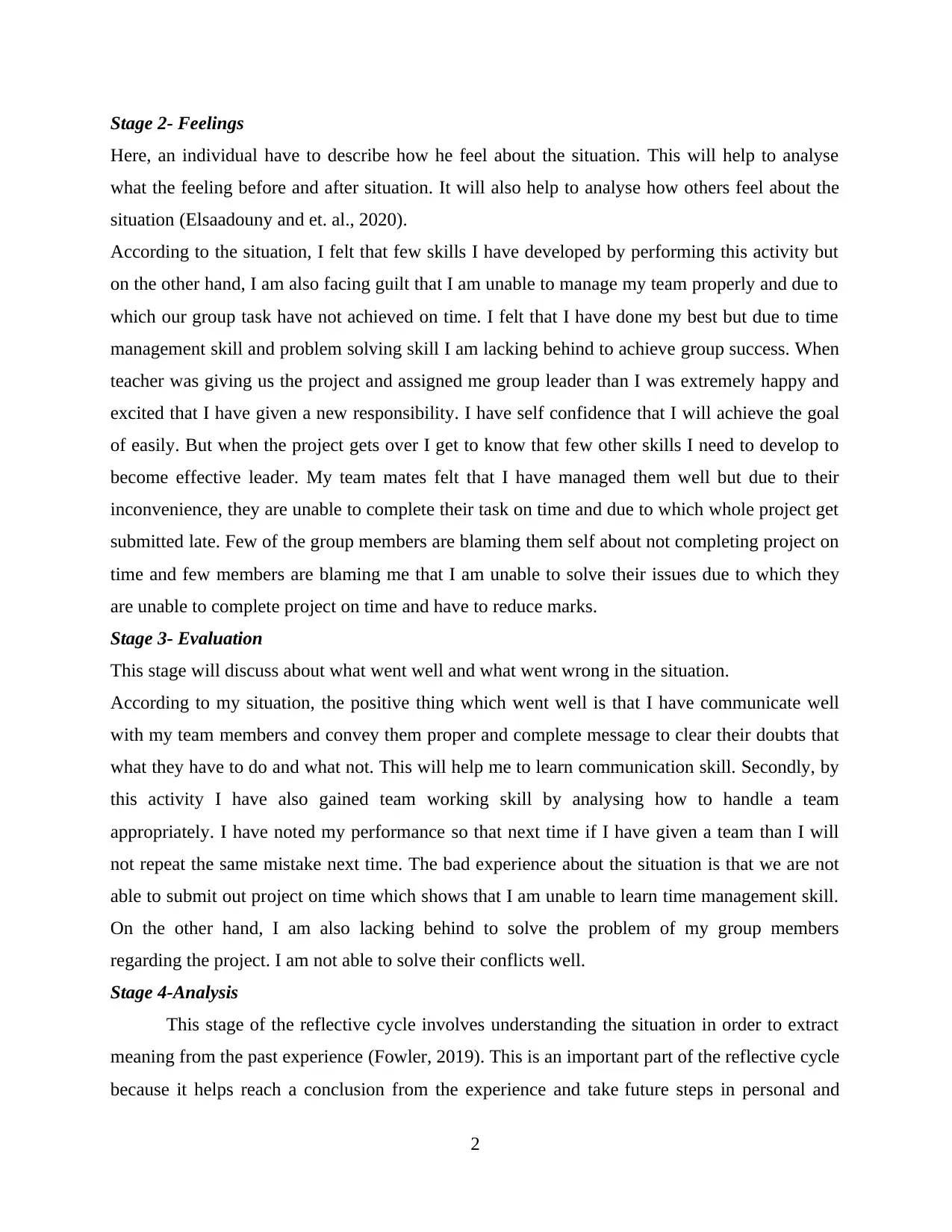
Stage 2- Feelings
Here, an individual have to describe how he feel about the situation. This will help to analyse
what the feeling before and after situation. It will also help to analyse how others feel about the
situation (Elsaadouny and et. al., 2020).
According to the situation, I felt that few skills I have developed by performing this activity but
on the other hand, I am also facing guilt that I am unable to manage my team properly and due to
which our group task have not achieved on time. I felt that I have done my best but due to time
management skill and problem solving skill I am lacking behind to achieve group success. When
teacher was giving us the project and assigned me group leader than I was extremely happy and
excited that I have given a new responsibility. I have self confidence that I will achieve the goal
of easily. But when the project gets over I get to know that few other skills I need to develop to
become effective leader. My team mates felt that I have managed them well but due to their
inconvenience, they are unable to complete their task on time and due to which whole project get
submitted late. Few of the group members are blaming them self about not completing project on
time and few members are blaming me that I am unable to solve their issues due to which they
are unable to complete project on time and have to reduce marks.
Stage 3- Evaluation
This stage will discuss about what went well and what went wrong in the situation.
According to my situation, the positive thing which went well is that I have communicate well
with my team members and convey them proper and complete message to clear their doubts that
what they have to do and what not. This will help me to learn communication skill. Secondly, by
this activity I have also gained team working skill by analysing how to handle a team
appropriately. I have noted my performance so that next time if I have given a team than I will
not repeat the same mistake next time. The bad experience about the situation is that we are not
able to submit out project on time which shows that I am unable to learn time management skill.
On the other hand, I am also lacking behind to solve the problem of my group members
regarding the project. I am not able to solve their conflicts well.
Stage 4-Analysis
This stage of the reflective cycle involves understanding the situation in order to extract
meaning from the past experience (Fowler, 2019). This is an important part of the reflective cycle
because it helps reach a conclusion from the experience and take future steps in personal and
2
Here, an individual have to describe how he feel about the situation. This will help to analyse
what the feeling before and after situation. It will also help to analyse how others feel about the
situation (Elsaadouny and et. al., 2020).
According to the situation, I felt that few skills I have developed by performing this activity but
on the other hand, I am also facing guilt that I am unable to manage my team properly and due to
which our group task have not achieved on time. I felt that I have done my best but due to time
management skill and problem solving skill I am lacking behind to achieve group success. When
teacher was giving us the project and assigned me group leader than I was extremely happy and
excited that I have given a new responsibility. I have self confidence that I will achieve the goal
of easily. But when the project gets over I get to know that few other skills I need to develop to
become effective leader. My team mates felt that I have managed them well but due to their
inconvenience, they are unable to complete their task on time and due to which whole project get
submitted late. Few of the group members are blaming them self about not completing project on
time and few members are blaming me that I am unable to solve their issues due to which they
are unable to complete project on time and have to reduce marks.
Stage 3- Evaluation
This stage will discuss about what went well and what went wrong in the situation.
According to my situation, the positive thing which went well is that I have communicate well
with my team members and convey them proper and complete message to clear their doubts that
what they have to do and what not. This will help me to learn communication skill. Secondly, by
this activity I have also gained team working skill by analysing how to handle a team
appropriately. I have noted my performance so that next time if I have given a team than I will
not repeat the same mistake next time. The bad experience about the situation is that we are not
able to submit out project on time which shows that I am unable to learn time management skill.
On the other hand, I am also lacking behind to solve the problem of my group members
regarding the project. I am not able to solve their conflicts well.
Stage 4-Analysis
This stage of the reflective cycle involves understanding the situation in order to extract
meaning from the past experience (Fowler, 2019). This is an important part of the reflective cycle
because it helps reach a conclusion from the experience and take future steps in personal and
2
⊘ This is a preview!⊘
Do you want full access?
Subscribe today to unlock all pages.

Trusted by 1+ million students worldwide
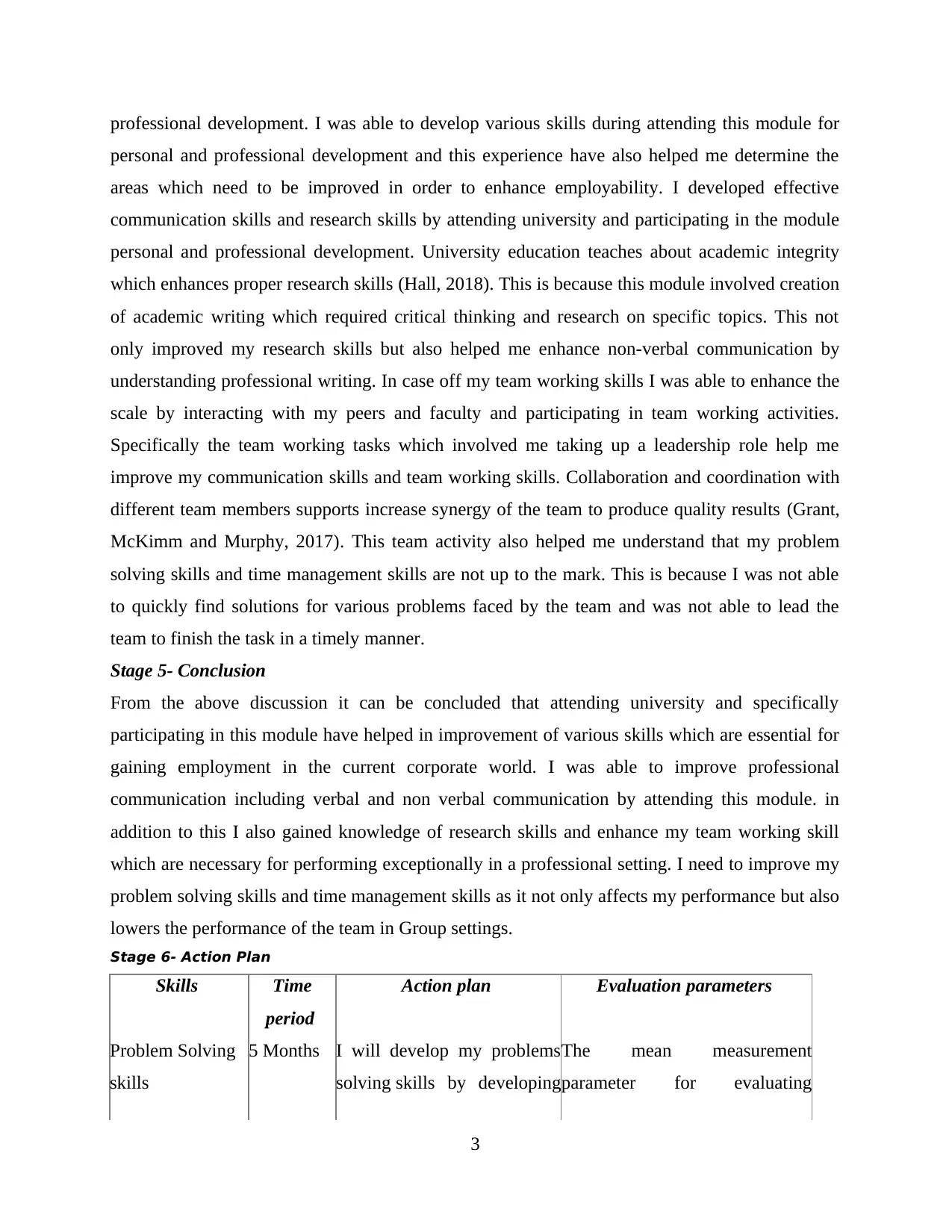
professional development. I was able to develop various skills during attending this module for
personal and professional development and this experience have also helped me determine the
areas which need to be improved in order to enhance employability. I developed effective
communication skills and research skills by attending university and participating in the module
personal and professional development. University education teaches about academic integrity
which enhances proper research skills (Hall, 2018). This is because this module involved creation
of academic writing which required critical thinking and research on specific topics. This not
only improved my research skills but also helped me enhance non-verbal communication by
understanding professional writing. In case off my team working skills I was able to enhance the
scale by interacting with my peers and faculty and participating in team working activities.
Specifically the team working tasks which involved me taking up a leadership role help me
improve my communication skills and team working skills. Collaboration and coordination with
different team members supports increase synergy of the team to produce quality results (Grant,
McKimm and Murphy, 2017). This team activity also helped me understand that my problem
solving skills and time management skills are not up to the mark. This is because I was not able
to quickly find solutions for various problems faced by the team and was not able to lead the
team to finish the task in a timely manner.
Stage 5- Conclusion
From the above discussion it can be concluded that attending university and specifically
participating in this module have helped in improvement of various skills which are essential for
gaining employment in the current corporate world. I was able to improve professional
communication including verbal and non verbal communication by attending this module. in
addition to this I also gained knowledge of research skills and enhance my team working skill
which are necessary for performing exceptionally in a professional setting. I need to improve my
problem solving skills and time management skills as it not only affects my performance but also
lowers the performance of the team in Group settings.
Stage 6- Action Plan
Skills Time
period
Action plan Evaluation parameters
Problem Solving
skills
5 Months I will develop my problems
solving skills by developing
The mean measurement
parameter for evaluating
3
personal and professional development and this experience have also helped me determine the
areas which need to be improved in order to enhance employability. I developed effective
communication skills and research skills by attending university and participating in the module
personal and professional development. University education teaches about academic integrity
which enhances proper research skills (Hall, 2018). This is because this module involved creation
of academic writing which required critical thinking and research on specific topics. This not
only improved my research skills but also helped me enhance non-verbal communication by
understanding professional writing. In case off my team working skills I was able to enhance the
scale by interacting with my peers and faculty and participating in team working activities.
Specifically the team working tasks which involved me taking up a leadership role help me
improve my communication skills and team working skills. Collaboration and coordination with
different team members supports increase synergy of the team to produce quality results (Grant,
McKimm and Murphy, 2017). This team activity also helped me understand that my problem
solving skills and time management skills are not up to the mark. This is because I was not able
to quickly find solutions for various problems faced by the team and was not able to lead the
team to finish the task in a timely manner.
Stage 5- Conclusion
From the above discussion it can be concluded that attending university and specifically
participating in this module have helped in improvement of various skills which are essential for
gaining employment in the current corporate world. I was able to improve professional
communication including verbal and non verbal communication by attending this module. in
addition to this I also gained knowledge of research skills and enhance my team working skill
which are necessary for performing exceptionally in a professional setting. I need to improve my
problem solving skills and time management skills as it not only affects my performance but also
lowers the performance of the team in Group settings.
Stage 6- Action Plan
Skills Time
period
Action plan Evaluation parameters
Problem Solving
skills
5 Months I will develop my problems
solving skills by developing
The mean measurement
parameter for evaluating
3
Paraphrase This Document
Need a fresh take? Get an instant paraphrase of this document with our AI Paraphraser
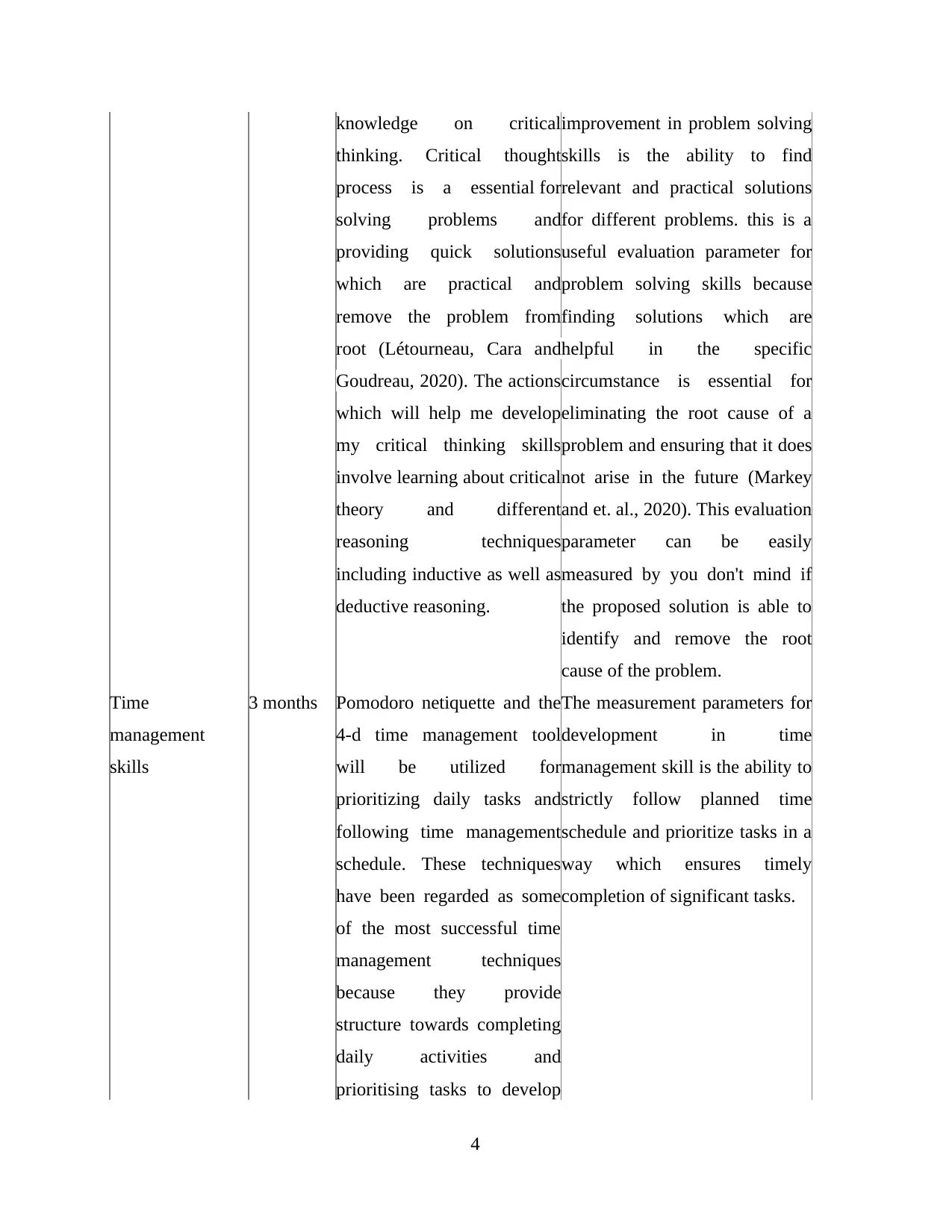
knowledge on critical
thinking. Critical thought
process is a essential for
solving problems and
providing quick solutions
which are practical and
remove the problem from
root (Létourneau, Cara and
Goudreau, 2020). The actions
which will help me develop
my critical thinking skills
involve learning about critical
theory and different
reasoning techniques
including inductive as well as
deductive reasoning.
improvement in problem solving
skills is the ability to find
relevant and practical solutions
for different problems. this is a
useful evaluation parameter for
problem solving skills because
finding solutions which are
helpful in the specific
circumstance is essential for
eliminating the root cause of a
problem and ensuring that it does
not arise in the future (Markey
and et. al., 2020). This evaluation
parameter can be easily
measured by you don't mind if
the proposed solution is able to
identify and remove the root
cause of the problem.
Time
management
skills
3 months Pomodoro netiquette and the
4-d time management tool
will be utilized for
prioritizing daily tasks and
following time management
schedule. These techniques
have been regarded as some
of the most successful time
management techniques
because they provide
structure towards completing
daily activities and
prioritising tasks to develop
The measurement parameters for
development in time
management skill is the ability to
strictly follow planned time
schedule and prioritize tasks in a
way which ensures timely
completion of significant tasks.
4
thinking. Critical thought
process is a essential for
solving problems and
providing quick solutions
which are practical and
remove the problem from
root (Létourneau, Cara and
Goudreau, 2020). The actions
which will help me develop
my critical thinking skills
involve learning about critical
theory and different
reasoning techniques
including inductive as well as
deductive reasoning.
improvement in problem solving
skills is the ability to find
relevant and practical solutions
for different problems. this is a
useful evaluation parameter for
problem solving skills because
finding solutions which are
helpful in the specific
circumstance is essential for
eliminating the root cause of a
problem and ensuring that it does
not arise in the future (Markey
and et. al., 2020). This evaluation
parameter can be easily
measured by you don't mind if
the proposed solution is able to
identify and remove the root
cause of the problem.
Time
management
skills
3 months Pomodoro netiquette and the
4-d time management tool
will be utilized for
prioritizing daily tasks and
following time management
schedule. These techniques
have been regarded as some
of the most successful time
management techniques
because they provide
structure towards completing
daily activities and
prioritising tasks to develop
The measurement parameters for
development in time
management skill is the ability to
strictly follow planned time
schedule and prioritize tasks in a
way which ensures timely
completion of significant tasks.
4

timely performance (Mahon
and O'Neill, 2020).
5
and O'Neill, 2020).
5
⊘ This is a preview!⊘
Do you want full access?
Subscribe today to unlock all pages.

Trusted by 1+ million students worldwide
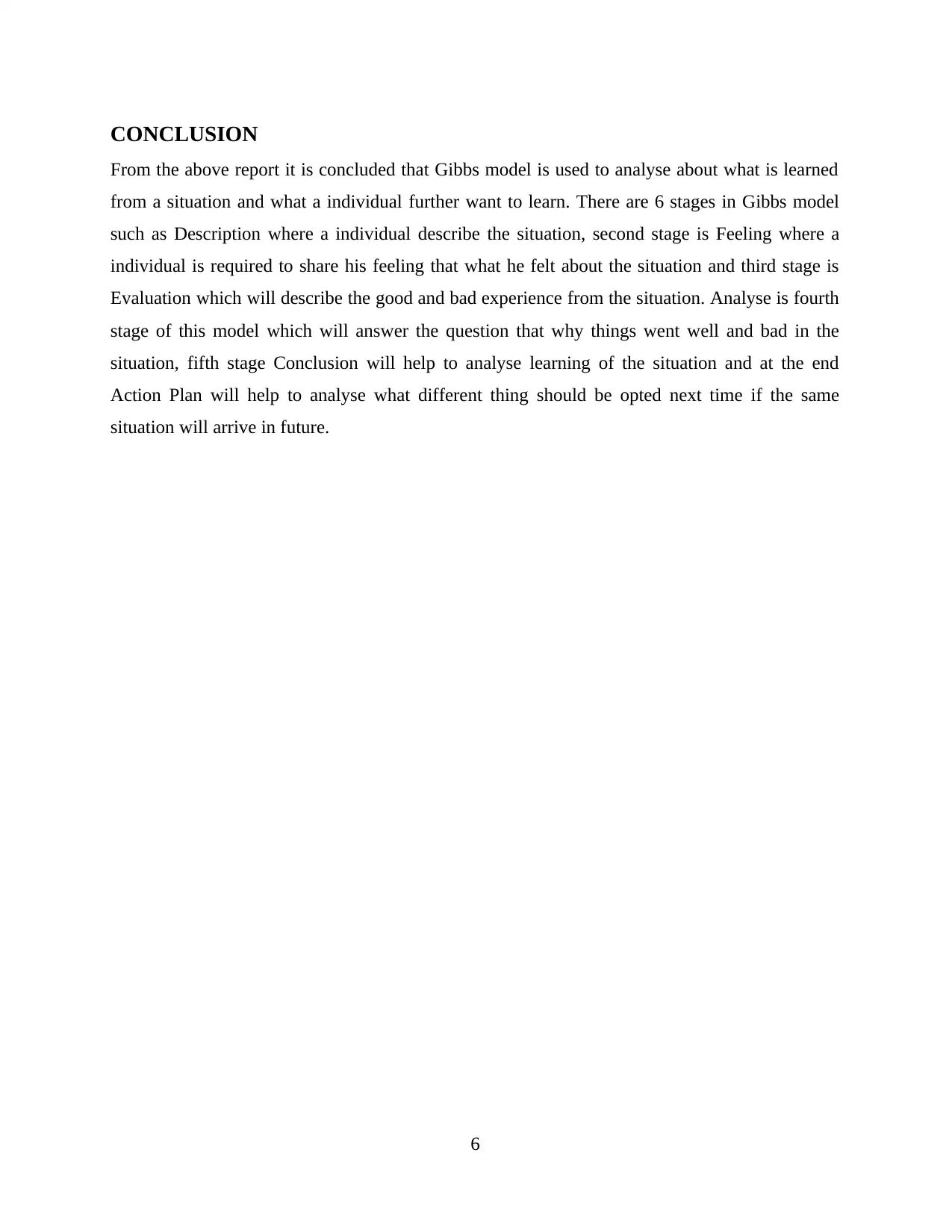
CONCLUSION
From the above report it is concluded that Gibbs model is used to analyse about what is learned
from a situation and what a individual further want to learn. There are 6 stages in Gibbs model
such as Description where a individual describe the situation, second stage is Feeling where a
individual is required to share his feeling that what he felt about the situation and third stage is
Evaluation which will describe the good and bad experience from the situation. Analyse is fourth
stage of this model which will answer the question that why things went well and bad in the
situation, fifth stage Conclusion will help to analyse learning of the situation and at the end
Action Plan will help to analyse what different thing should be opted next time if the same
situation will arrive in future.
6
From the above report it is concluded that Gibbs model is used to analyse about what is learned
from a situation and what a individual further want to learn. There are 6 stages in Gibbs model
such as Description where a individual describe the situation, second stage is Feeling where a
individual is required to share his feeling that what he felt about the situation and third stage is
Evaluation which will describe the good and bad experience from the situation. Analyse is fourth
stage of this model which will answer the question that why things went well and bad in the
situation, fifth stage Conclusion will help to analyse learning of the situation and at the end
Action Plan will help to analyse what different thing should be opted next time if the same
situation will arrive in future.
6
Paraphrase This Document
Need a fresh take? Get an instant paraphrase of this document with our AI Paraphraser
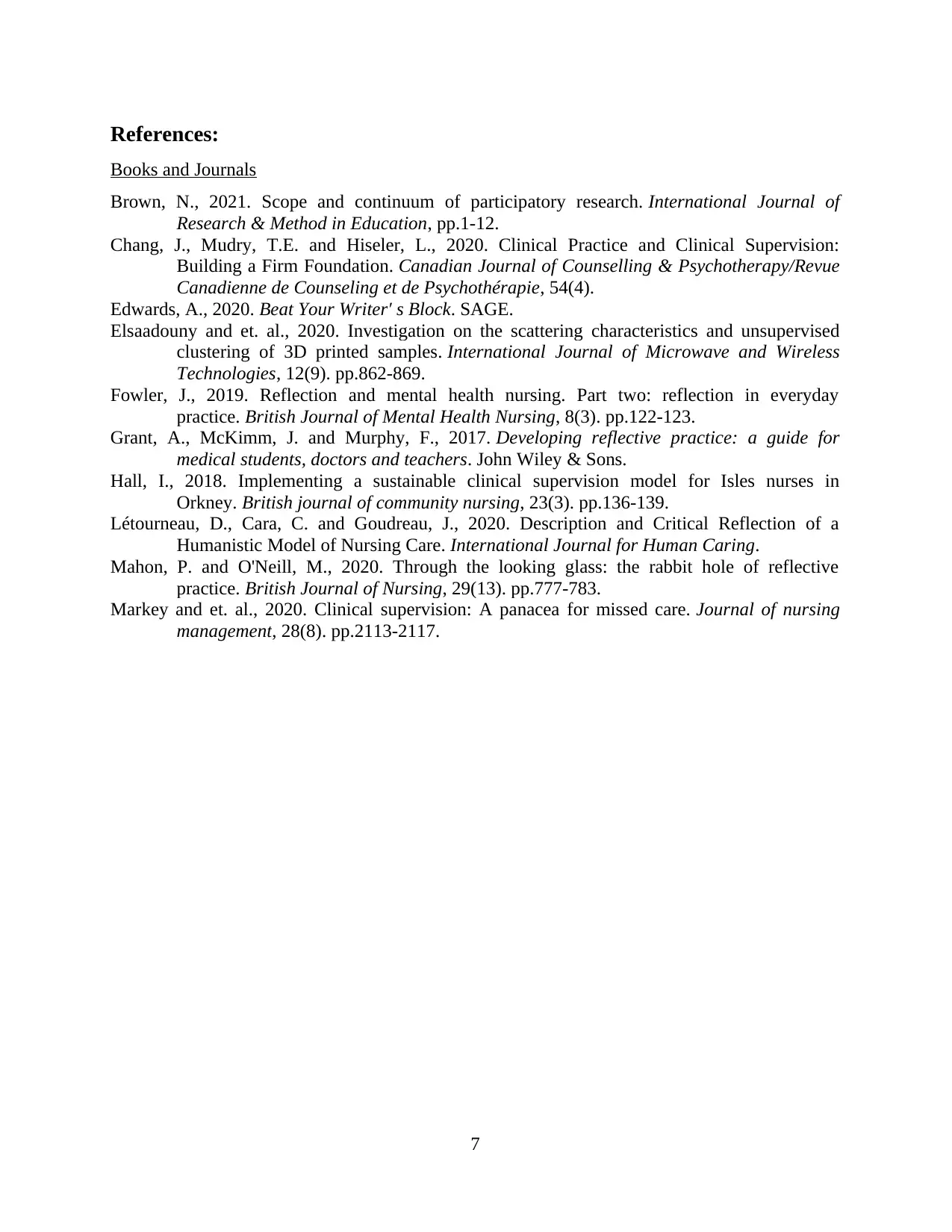
References:
Books and Journals
Brown, N., 2021. Scope and continuum of participatory research. International Journal of
Research & Method in Education, pp.1-12.
Chang, J., Mudry, T.E. and Hiseler, L., 2020. Clinical Practice and Clinical Supervision:
Building a Firm Foundation. Canadian Journal of Counselling & Psychotherapy/Revue
Canadienne de Counseling et de Psychothérapie, 54(4).
Edwards, A., 2020. Beat Your Writer′ s Block. SAGE.
Elsaadouny and et. al., 2020. Investigation on the scattering characteristics and unsupervised
clustering of 3D printed samples. International Journal of Microwave and Wireless
Technologies, 12(9). pp.862-869.
Fowler, J., 2019. Reflection and mental health nursing. Part two: reflection in everyday
practice. British Journal of Mental Health Nursing, 8(3). pp.122-123.
Grant, A., McKimm, J. and Murphy, F., 2017. Developing reflective practice: a guide for
medical students, doctors and teachers. John Wiley & Sons.
Hall, I., 2018. Implementing a sustainable clinical supervision model for Isles nurses in
Orkney. British journal of community nursing, 23(3). pp.136-139.
Létourneau, D., Cara, C. and Goudreau, J., 2020. Description and Critical Reflection of a
Humanistic Model of Nursing Care. International Journal for Human Caring.
Mahon, P. and O'Neill, M., 2020. Through the looking glass: the rabbit hole of reflective
practice. British Journal of Nursing, 29(13). pp.777-783.
Markey and et. al., 2020. Clinical supervision: A panacea for missed care. Journal of nursing
management, 28(8). pp.2113-2117.
7
Books and Journals
Brown, N., 2021. Scope and continuum of participatory research. International Journal of
Research & Method in Education, pp.1-12.
Chang, J., Mudry, T.E. and Hiseler, L., 2020. Clinical Practice and Clinical Supervision:
Building a Firm Foundation. Canadian Journal of Counselling & Psychotherapy/Revue
Canadienne de Counseling et de Psychothérapie, 54(4).
Edwards, A., 2020. Beat Your Writer′ s Block. SAGE.
Elsaadouny and et. al., 2020. Investigation on the scattering characteristics and unsupervised
clustering of 3D printed samples. International Journal of Microwave and Wireless
Technologies, 12(9). pp.862-869.
Fowler, J., 2019. Reflection and mental health nursing. Part two: reflection in everyday
practice. British Journal of Mental Health Nursing, 8(3). pp.122-123.
Grant, A., McKimm, J. and Murphy, F., 2017. Developing reflective practice: a guide for
medical students, doctors and teachers. John Wiley & Sons.
Hall, I., 2018. Implementing a sustainable clinical supervision model for Isles nurses in
Orkney. British journal of community nursing, 23(3). pp.136-139.
Létourneau, D., Cara, C. and Goudreau, J., 2020. Description and Critical Reflection of a
Humanistic Model of Nursing Care. International Journal for Human Caring.
Mahon, P. and O'Neill, M., 2020. Through the looking glass: the rabbit hole of reflective
practice. British Journal of Nursing, 29(13). pp.777-783.
Markey and et. al., 2020. Clinical supervision: A panacea for missed care. Journal of nursing
management, 28(8). pp.2113-2117.
7
1 out of 8
Related Documents
Your All-in-One AI-Powered Toolkit for Academic Success.
+13062052269
info@desklib.com
Available 24*7 on WhatsApp / Email
![[object Object]](/_next/static/media/star-bottom.7253800d.svg)
Unlock your academic potential
Copyright © 2020–2025 A2Z Services. All Rights Reserved. Developed and managed by ZUCOL.





